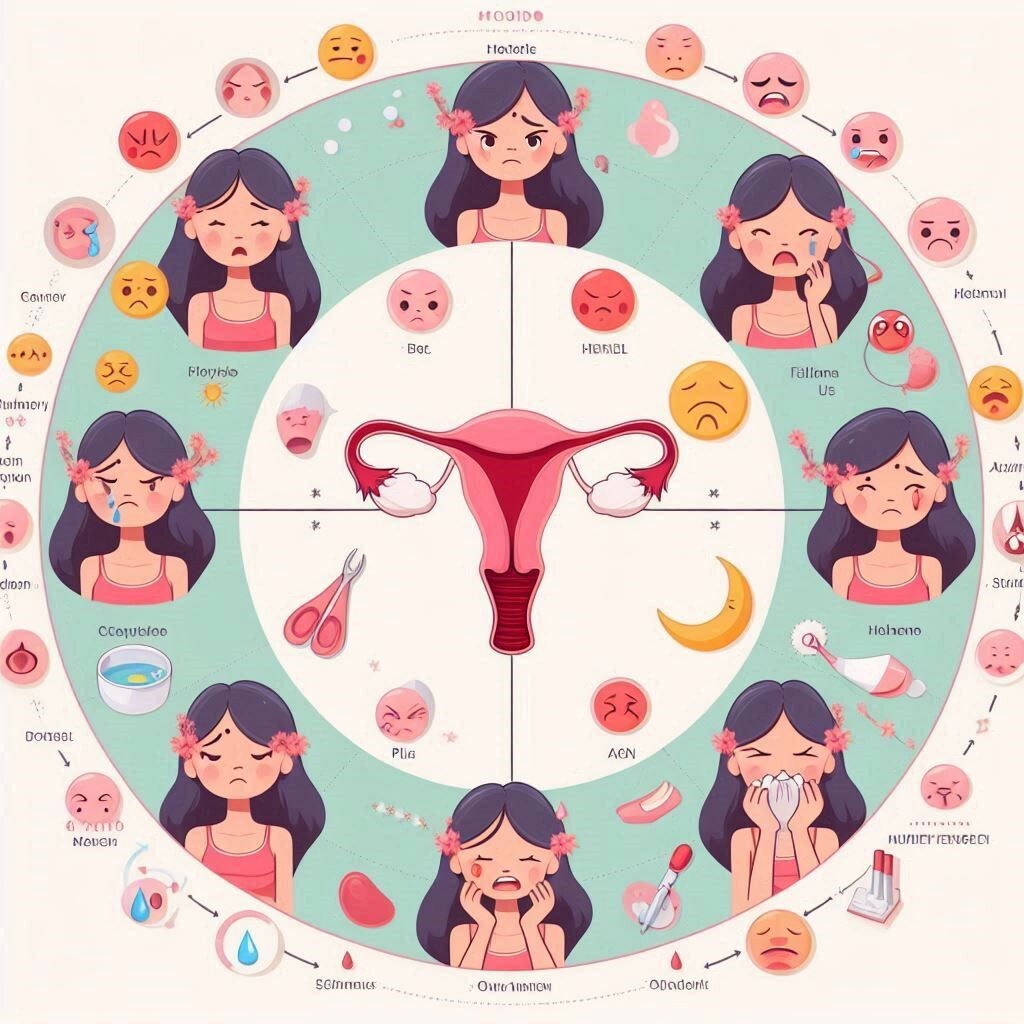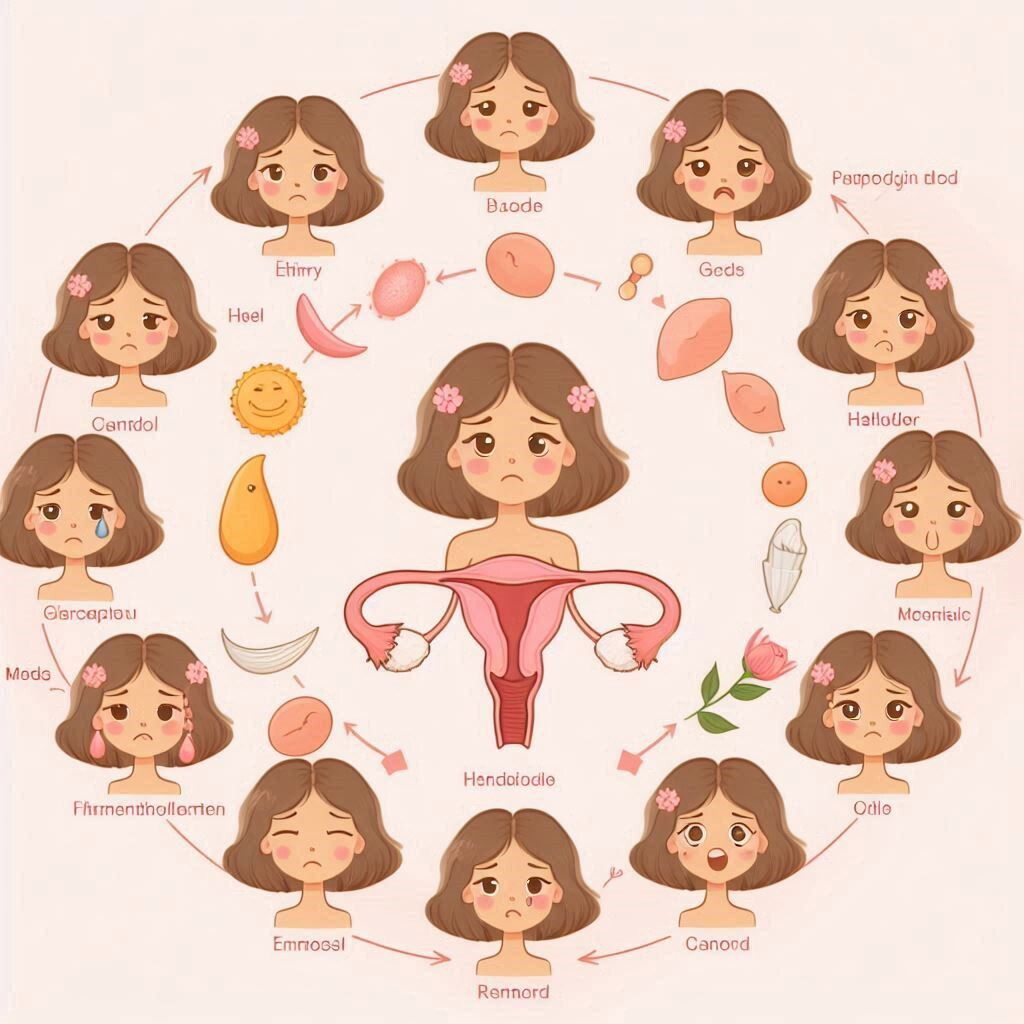The Phases of Menstrual Cycle Moods: A Comprehensive Guide

Introduction
The menstrual cycle is an essential natural process in women’s reproductive health. From the beginning to the end of the menstrual cycle, hormones fluctuate significantly, leading to mood differences, including energy levels and periodic emotional stability. As a woman, understanding mood changes is crucial for daily activities and overall health. The following guide covers the menstrual cycle phases, highlighting how each phase affects your moods and how to properly manage these mood changes.
Phases of Menstrual Cycle Moods
Menstrual Phase
This phase is known as the period and marks the start of the menstrual cycle. Periods usually last for three to seven days or depending on an individual. In this phase, the uterine lining shed, which means that blood and cells in the line are released. At this point, the hormone levels in your body are usually at their lowest. The two hormones are estrogen and progesterone.
Relative moods of the menstrual phase
Low levels of the hormone lead to varying moods: tired, easily irritated, and sometimes depressed. It is common to experience mood swings, and the period makes you feel more sensitive to any feeling that gets in your way.
The Follicular Phase
This phase follows immediately after the period and continues up to ovulation. At this phase, small particles called follicles begin to grow. Growth of these particles is fueled by the high increase in estrogen hormone, and the phase duration is, however, 14 days.
Mood changes in follicular Phase
During the follicular phase, the level of estrogen increases. In this period, many women experience boosting up energy and mood. This hormone also has a positive influence on serotonin that refers to the “feel good” neurotransmitter. For all these reasons, women’s mood is enhanced and they typically feel more motivated and socially active. Thus, this is a proper time to get engaged with any activities and projects.
Ovulation Phase
Ovulation appears in the middle of the menstruation cycle. In most cases, it takes place on day 14 if the menstruation cycle lasts for 28 days. This stage presupposes that a mature egg is released from the ovary, and it may be fertilized by the sperm.
Mood Changes During Ovulation
Due to the high level of estrogen, people feel more energetic, more confident, and self-improved within ovulation. Many women admit that they feel more attractive and they become more sociable. However, as soon as the ovulation is finished, the level of estrogen decreases and the level of progesterone increases. This may lead to mood swings that may sometimes result in anxiety.
The Luteal Phase
The luteal phase lasts after ovulation until the period of menstruation. Generally, this is around 14 days. This is the phase when progesterone is the dominant hormone. It helps the body get prepared for the potential pregnancy.
Mood Changes During Luteal Phase
The progesterone causes some restrictions to the brain and makes people feel very calm and relaxed. Nevertheless, in some cases, women may have premenstrual syndrome, and they may experience frequent mood swings, anxiety, and irritation in the last days of the luteal phase. The hormone level changes quickly to fall, and both estrogen and progesterone levels lower. Solid premenstrual syndrome can negatively affect the mood swings.
Reproductive Health and Mood Management
Diet and Nutrition
A balanced diet may help prevent mood swings that interfere with the menstrual cycle. Foods rich in omega-3 fatty acids, magnesium, and complex carbohydrates may also help to maintain optimal hormonal balance and mental health.
Exercise and Physical Activity
Regular physical activity is very beneficial in managing mood swings. Exercise can help boost endorphin levels, which can help counteract the feelings of depression and anxiety that come along with mood swings. Especially yoga, walking, and swimming are very effective during the menstrual phase, when women often report low energy.
Stress Management
Chronic stress affects mood swings. Effective stress management include mindfulness, meditation, deep breathing exercise. Adequate sleep and other sleep health measures and engaging in relaxing activities can help manage mood.
Medical Interventions
Sometimes medical interventions may be necessary if the mood swings are intense. In such cases, a woman may require collaborating with a healthcare provider. Women can be treated with hormonal contraceptives and/or may be given antidepressants or any other medications that are ordered or prescribed for them. Note that every woman is different and advice/ treatment plan should come from a healthcare.
Tracking your Cycle
By knowing your menstrual cycle, tracking the pattern of when your mood changes can help prepare better for them and also let you know how your body responds to hormonal changes. There are phones apps and written journals you can use to keep a track of your symptoms.
FAQs
Q1. What causes mood swing during Menstrual cycle?
It is caused by hormone fluctuations. The two hormones, estrogen and progesterone increase and decrease in this cycle affect neurotransmitters inside the brain. For example, low level of estrogen and serotonin affect the neurotransmitter and can cause depression anger in some women.
Q2. How can I manage mood swing during my period?
Mood swing can be best manage through good dieting, exercises and stress measures as earlier pointed out. Moreover, when there are will seemingly no changes, then, it is time to consult a health provider.
Q3. Is it normal to feel depressed before a period?
Yes, many women suffer from depression because of Premenstrual Syndrome, mainly because of hormonal changes.
Q4. Can birth control help with menstrual cycle mood swings?
Birth control may help with menstrual cycle mood swings. However, mood swings can also be the result of fluctuating hormone levels. Hormonal contraceptives can stabilize hormone levels, which may reduce the severity of mood swings for some women. Note, that a healthcare provider can help you determine the best option for you.
Q5. Are there any natural remedies for menstrual cycle mood swings?
Natural remedies for menstrual cycle mood swings. These include maintaining a balanced diet, regular exercise, stress reduction techniques, and using supplements. Magnesium and omega-3 fatty acids are among the supplement that may help.
Q6. When should I see a doctor?
Seek help from a healthcare provider if your mood swings are severe or persistent and interfere with your daily life. A healthcare provider can offer appropriate treatments and support.
Conclusion
It is essential for managing emotional health and overall well-being to understand the phases of the menstrual cycle and their impact on moods. By recognizing the patterns and implementing effective strategies, it is easier for women to navigate the changes with confidence. A healthy lifestyle, stress management, and seeking medical advice are critical for achieving a balance throughout the month.
